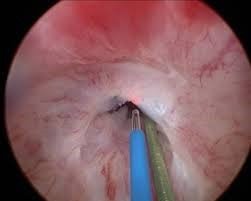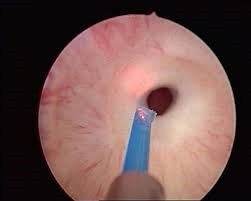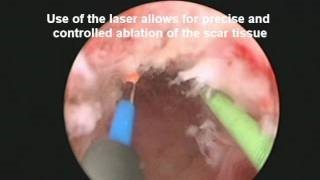
STRICTURE URETHRA
A urethral stricture occurs when scarring narrows the tube that carries urine out of your body. Urethral stricture restricts the flow of urine from the bladder and can cause a variety of medical problems in the urinary tract, including inflammation or infection.

What is Laser OIU?
Laser Optical Internal Urethrotomy (OIU) is a minimally invasive surgical procedure used to cure urethral strictures. Urethral stricture is a condition where the urethra, the pipe that carries urine from the bladder out of the body, becomes narrowed due to scarring or inflammation. This narrowing can cause difficulty with urination, decreased urine flow, urinary retention, and other symptoms. Laser OIU is typically performed as an procedure under local or general anaesthesia. It is often preferred over traditional surgical techniques like open urethral reconstruction because it is less invasive and associated with fewer complications.
Doctors Info on Laser OIU
Dr Raju R is a highly experienced urologist in Bangalore, specializing in the treatment of urethral stricture using the Laser OIU procedure. This procedure is particularly suitable for:
- Short urethral stricture (less than 10 mm in length)
- Urethral stricture caused by trauma
- Urethral stricture resulting from prior surgery
- Idiopathic stricture (without any known cause)

Initial Examination
During your consultation, you will undergo a comprehensive examination and receive detailed explanations regarding the procedure. The following tests will be conducted:
- Urinalysis and Urine Culture
- Blood Tests for preoperative assessment
- Uroflowmetry
- Micturating Cystourethrogram (MCU) X-ray
- Retrograde Urethrogram (RGU) X-ray
- A Urethroscopy is scheduled to precisely determine the location and extent of the narrowed segment.
Day of the Procedure
Kindly be informed that you will be required to refrain from consuming any food or beverages for a minimum duration of 6 hours prior to your scheduled surgical procedure. An intravenous line will be established to facilitate the administration of preoperative doses of antibiotics. Subsequently, the anaesthesiologist will conduct a comprehensive medical history assessment to determine the most appropriate anaesthesia technique for your case.
Will I be Awake during the Procedure?
The level of your consciousness during the surgical procedure will depend on the type of anaesthesia employed.
- General anaesthesia: This method induces a state of complete unconsciousness throughout the surgical procedure, ensuring that you will not retain any memory of the event.
- Regional anaesthesia (e.g., Spinal or Epidural): This technique involves the precise placement of a needle into your back to administer anaesthetic medication. This will effectively numb the lower half of your body from the umbelicus down. While you will remain awake during the procedure, you will experience a state of drowsiness and will not perceive any pain during the surgery.
Procedure
- During the procedure, a cystoscope, a medical instrument equipped with a camera, will be carefully inserted into the urethra to enable visualization of its internal structure on a monitor.
- The surgeon will meticulously examine the urethra using the cystoscope to precisely locate the stricture and evaluate its severity.
- Upon identification of the stricture, a laser fibre will be skilfully introduced through the cystoscope. This laser emits concentrated light energy, allowing for the precise vaporization and removal of the scar tissue responsible for the stricture. The surgeon will expertly manoeuvre the laser fibre to target and ablate the narrowed area.
- Throughout the procedure, the surgeon will continuously monitor the urethra's condition and make necessary adjustments to the laser settings to ensure effective treatment.
- Once the stricture has been successfully addressed, the laser and cystoscope will be carefully removed from the urethra, completing the procedure.
After the Procedure:
You will be moved to the postoperative recovery room with the catheter in place. Dr Raju R will evaluate your condition and provide detailed instructions for post-operative care. You will be discharged the next day after the catheter is removed. A follow-up visit is recommended 3 to 5 days later to assess your recovery and adjust medications as needed. Please feel free to ask any questions you may have.
Advantages of Laser OIU
- Reduced blood loss
- Shorter hospital stays
- Next-day discharge
- High success rates
Side Effects of Laser OIU
- Hemorrhage - In rare instances, small blood clots may form and require irrigation through the catheter.
- Urinary Tract Infection (UTI) - This may manifest as a burning sensation during urination, frequent urination, and an intense urge to urinate. Typically, a few days of antibiotic treatment can resolve this issue.
- Incontinence - While uncommon, incontinence may occur.
- Stricture Recurrence - In some cases, strictures may recur after several years, necessitating additional surgical intervention.
Frequently asked questions
Is Laser OIU Safe?
Yes, but it's important to note that redo procedures and those for longer strictures tend to have a higher incidence of failure.
When Laser OIU is Needed?
Laser OIU is a widely recognized and highly effective treatment for urethral stricture, which can lead to obstructive urination patterns. Obstructive symptoms may include:
- Straining (the need to push to initiate urination)
- Hesitancy (delayed onset of urination after the urge to urinate)
- Slow or diminished force of the urine stream
- A thin or forked (split or spray-like) stream
- Intermittency (urine stream that starts and stops)
- Sensation of incomplete emptying
Irritative symptoms may include:
- Increased frequency of urination
- Urgency to urinate
- Nocturia (getting up at night to urinate).
What Would Disqualify Me from Laser OIU Surgery?
- Urinary tract infection.
- Any medical condition, such as uncontrolled hypertension, diabetes, or heart disease, that poses a risk during anaesthesia.
Why Choose Genesis Superspeciality Hospital for Laser OIU Surgery?
- Genesis Superspeciality Hospital always prioritizes patient safety, comfort, and satisfaction throughout the treatment process. Dr. Raju R possesses a remarkable history of achieving successful results and holds substantial expertise in the treatment of urethral conditions. With exceptional surgical outcomes and competitive pricing, our facility offers prompt surgical scheduling, minimizing patient wait times.
Dr. Raju R is an exceptional and highly skilled genitourinary surgeon (urologist) and andrologist whose capabilities in the operating room are truly commendable. Dr Raju R did his MBBS from Mysore Medical college and Research Institute (MMCRI), and he completed his M.Ch in Urology from Vijaynagara Institute of Medical Sciences (VIMS) Karnataka. Known for his scrupulous attention to detail, Dr Raju R with 13+ years of experience approaches each surgical case with a thorough understanding of the patient’s unique needs and tailors his approach accordingly.
Dr Raju R has completed 5000+ Urology and Andrology Surgeries. Beyond his surgical skills, Dr Raju fosters a sense of trust and reassurance among his patients. His clear communication, both pre-and post-surgery, helps the patient feel informed and at ease throughout their medical journey. Dr Raju’s commitment to patient-centred care contributes to a positive overall experience for those under his supervision.



